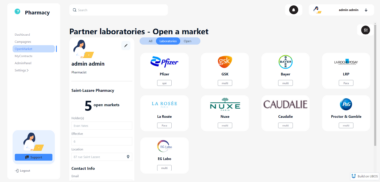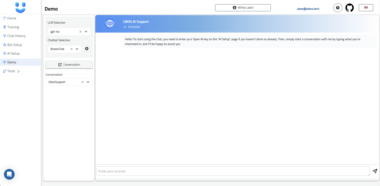Playwright-MCP: Bridging the Gap Between LLMs and Browser Automation with UBOS
In the rapidly evolving landscape of AI and automation, the ability to seamlessly integrate Large Language Models (LLMs) with real-world applications is paramount. Playwright-MCP, a Playwright wrapper for the Model Context Protocol (MCP), emerges as a crucial tool in this endeavor. It empowers LLM-powered clients to directly control and interact with browsers, unlocking a vast array of automation possibilities. Integrated with UBOS, the full-stack AI Agent development platform, Playwright-MCP offers a streamlined and powerful approach to building intelligent agents capable of navigating and manipulating the web.
Understanding the Power of MCP
At its core, MCP is an open protocol designed to standardize how applications expose context to LLMs. This standardization is critical for creating interoperable and reusable AI components. Without a unified protocol, integrating LLMs with different applications becomes a complex and often bespoke process. MCP provides a common language, enabling developers to build LLMs that can understand and interact with various data sources and tools in a consistent manner.
Playwright-MCP: A Concrete Implementation of MCP
Playwright-MCP brings the power of MCP to browser automation. By wrapping the popular Playwright testing and automation library, it provides LLMs with a robust and reliable interface for controlling browsers. This allows LLMs to perform tasks such as:
- Web Scraping: Extract data from websites with unprecedented accuracy and efficiency.
- Automated Testing: Develop and execute automated tests for web applications, ensuring quality and reliability.
- Form Filling: Automate the process of filling out web forms, saving time and reducing errors.
- Social Media Automation: Manage social media accounts, post updates, and engage with followers.
- E-commerce Automation: Automate tasks such as product listing, order management, and customer support.
- Research and Data Gathering: Automatically gather information from various online sources for research purposes.
Key Features and Capabilities
Playwright-MCP boasts a rich set of features designed to facilitate seamless LLM-browser interaction:
- Resource Exposure: The server intelligently exposes browser screenshots as readily accessible resources. Each open page is assigned a unique
screenshot://{page_id}URI, enabling LLMs to easily retrieve visual representations of the page content. - Prompting for Interpretation: The integrated
interpret-pageprompt empowers LLMs to analyze and understand the structure and content of web pages. This prompt can be further refined with optional arguments likepage_idto focus on specific pages andfocusto highlight specific aspects like forms, navigation, or text. The prompt returns both a textual analysis and a screenshot, providing a comprehensive view for the LLM. - Comprehensive Browser Automation Tools: The server provides a suite of tools for controlling browser behavior:
- Navigation:
navigatefor URL traversal,new_pagefor creating new tabs,switch_pagefor tab management, andget_pagesfor listing available pages. - Interaction:
clickfor element interaction via CSS selectors,typefor text input into form fields, andwait_for_selectorfor ensuring elements are loaded before interaction. - Content Extraction:
get_textfor extracting text from elements,get_page_contentfor retrieving the full HTML source, andtake_screenshotfor capturing visual representations.
- Navigation:
Use Cases: Unleashing the Potential of LLM-Powered Browser Automation
The versatility of Playwright-MCP makes it applicable to a wide range of use cases:
- AI-Powered Customer Service: Automate responses to customer inquiries by extracting information from FAQs and knowledge base articles.
- Intelligent Data Extraction: Build custom web scrapers that can extract structured data from complex websites with minimal human intervention.
- Automated Report Generation: Automatically generate reports by collecting data from various online sources and formatting it into a presentable format.
- Dynamic Content Creation: Create dynamic web content based on real-time data extracted from the web.
- SEO Optimization: Analyze website performance and identify areas for improvement by automatically crawling and analyzing web pages.
Integrating with UBOS: A Synergistic Approach
UBOS provides a robust platform for orchestrating AI Agents, connecting them with enterprise data, and building custom AI Agents with your LLM model. Playwright-MCP integrates seamlessly with UBOS, enabling developers to leverage the platform’s capabilities to build sophisticated AI-powered browser automation solutions.
Benefits of Using Playwright-MCP with UBOS:
- Simplified Agent Orchestration: UBOS simplifies the process of managing and coordinating multiple AI Agents, making it easier to build complex automation workflows.
- Seamless Data Integration: UBOS allows you to connect your AI Agents with various data sources, including databases, APIs, and cloud storage, enabling them to access the information they need to perform their tasks.
- Customizable Agent Development: UBOS provides a flexible framework for building custom AI Agents with your LLM model, allowing you to tailor your agents to meet your specific needs.
- Multi-Agent Systems: UBOS facilitates the creation of Multi-Agent Systems, where multiple AI Agents work together to achieve a common goal. This allows you to build more sophisticated and powerful automation solutions.
Configuration and Quickstart
Setting up Playwright-MCP is straightforward. First, install the necessary dependencies using uv add playwright and playwright install chromium.
To configure the server, you’ll need to modify your Claude Desktop configuration file (either ~/Library/Application Support/Claude/claude_desktop_config.json on MacOS or %APPDATA%/Claude/claude_desktop_config.json on Windows). Add a new entry to the mcpServers section, specifying the command and arguments required to run the Playwright-MCP server. Example configurations for both development and published servers are provided in the original documentation.
Development and Debugging
The development process involves building and publishing the package. The uv sync command synchronizes dependencies and updates the lockfile. The uv build command creates source and wheel distributions in the dist/ directory. Finally, the uv publish command publishes the package to PyPI (requires setting PyPI credentials).
Debugging MCP servers, which run over stdio, can be challenging. The recommended approach is to use the MCP Inspector. The inspector can be launched using npx @modelcontextprotocol/inspector uv --directory /path/to/playwright-mcp run playwright-mcp. The Inspector provides a browser-based interface for debugging the server.
Conclusion: Embracing the Future of AI-Powered Automation
Playwright-MCP, combined with the power of UBOS, represents a significant step forward in the evolution of AI-powered automation. By providing a seamless bridge between LLMs and browser environments, it empowers developers to build intelligent agents that can interact with the web in sophisticated and meaningful ways. As the adoption of LLMs continues to grow, tools like Playwright-MCP will become increasingly essential for unlocking the full potential of AI in a wide range of applications.
Playwright Browser Automation Server
Project Details
- misanthropic-ai/playwrite-mcp
- Last Updated: 3/13/2025
Recomended MCP Servers

한국투자증권 mcp server


MCP server for Dub.co link shortener API integration


MCP server for interacting put.io
MCP server for Apache Gravitino(incubating)

A Model Context Protocol (MCP) server that empowers LLMs to use some of Open Srategy Partners' core writing...

A model context protocol server for drand
Infisical's official MCP server.
 From vibe coding to vibe deployment. UBOS MCP turns ideas into infra with one message.
From vibe coding to vibe deployment. UBOS MCP turns ideas into infra with one message.





